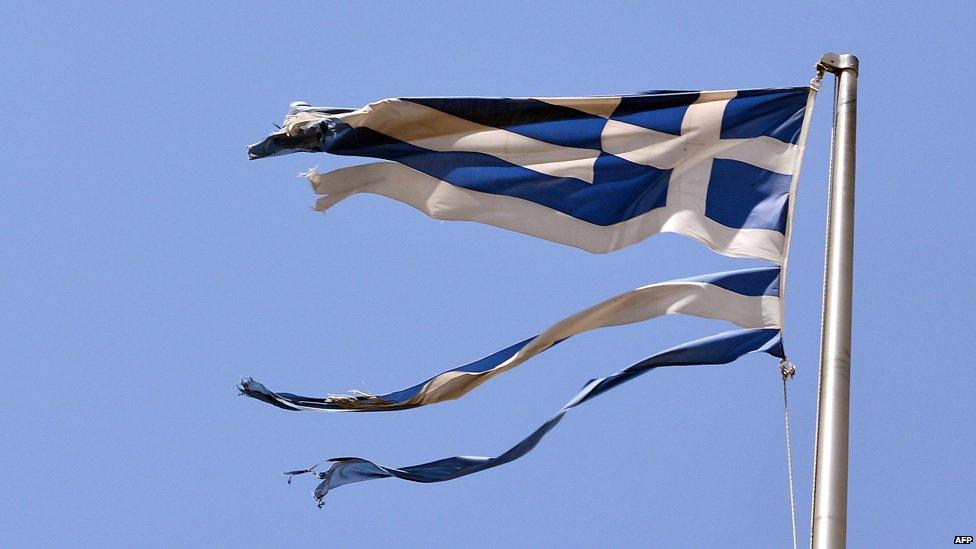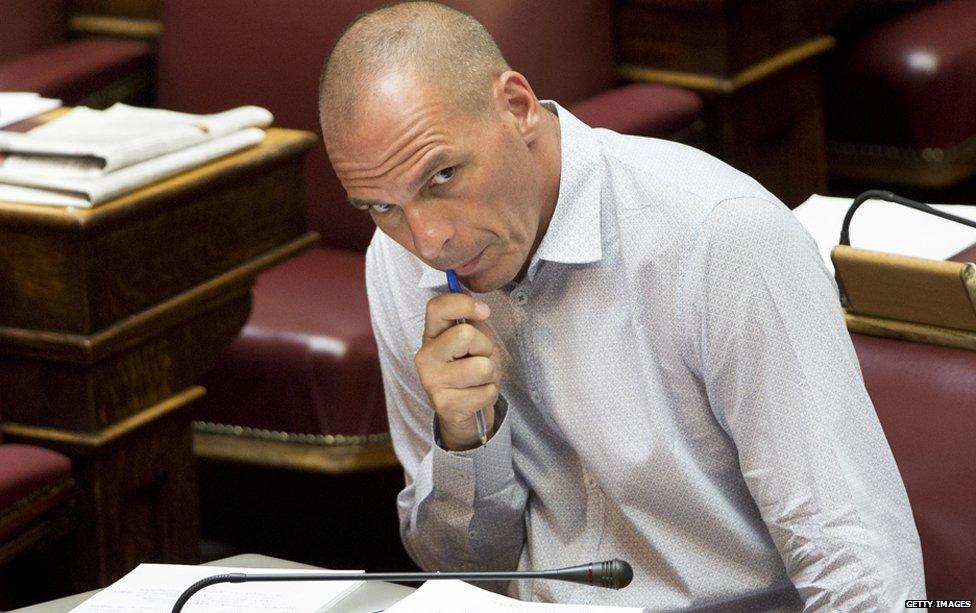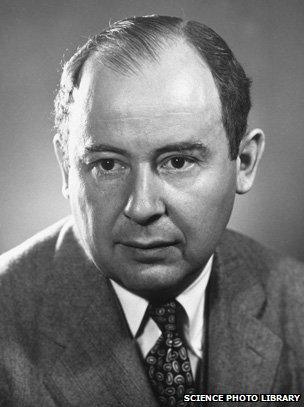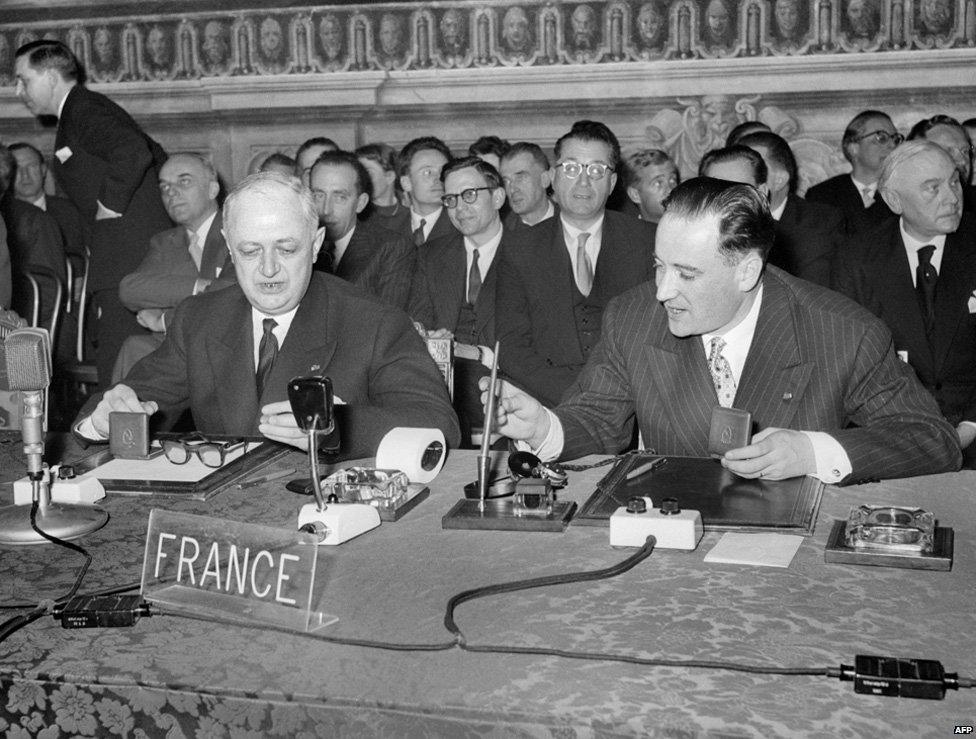A Point of View: Why Greece and the eurozone aren't playing games
- Published
- comments

Game theory can't explain the Greek crisis - the entire euro project is now in the hands of fate, writes philosopher John Gray.
After much drama, a third bailout has been announced for Greece and approved by the Greek parliament. The details have yet to be settled, but whatever deal finally emerges Greece's government will be compelled to impose more spending cuts and tax rises at a time when unemployment is already higher than it was in America during the Great Depression. The result will be to lock Greece into permanent poverty, while the burden of debt will never be paid off.
Greece has been forced to submit to another round of destructive and self-defeating austerity policies in order to save the euro. But the euro is weaker than it was before the deal, and many are beginning to consider what for respectable opinion has until now been a forbidden thought: the euro project may have been a colossal error. Instead of leaving it stronger, the deal that has been imposed has strengthened the suspicion that the single currency is irreparably flawed.
It seems a strange outcome for a deal reached among reasonable men and women. But was the deal a result of rational bargaining? If you listened to the media on the negotiations in Brussels, you'd be inclined to think so. There has been constant talk of stratagems and counter-stratagems, bluffs and double bluffs. The Greek drama has been interpreted as a high-stakes poker game, with each of the players trying to maximise their chance of winning.

It's an interpretation that's been all the more popular as a result of the fact that one of the players, Greece's former finance minister Yanis Varoufakis, has written an academic textbook on game theory. A familiar line of commentary has it that the Syriza government destroyed any credibility it may have had among European elites by reckless shifts in strategy. If only the Greeks had played their hand more shrewdly, a better deal could have been reached and the crisis could have been resolved. The eurozone could then become more integrated and more stable.
I think it's an unrealistic analysis. Unworkable and unreformable, the euro can only produce recurrent and worsening crises. But this can go on for only so long. The euro will break down through a process of political contagion, as resurgent nationalism and radical parties of opposition become stronger throughout Europe. The driving force of the currency's disintegration will be a mood of popular anger. Attempting to maintain the euro at any cost can only result in mounting desperation, which will seek expression in violence if no practicable policies are on offer to ameliorate the situation.

John von Neumann 1903-1957

Born in Hungary, von Neumann was one of the world's foremost mathematicians by his mid-20s
Pioneered game theory and was one of the conceptual inventors of the stored-program digital computer, alongside Alan Turing and Claude Shannon
Also performed pivotal work on quantum theory and the atomic bomb

Thinking about this situation in terms of game theory isn't terribly illuminating. The academic discipline that goes by the name is a branch of mathematics founded in the interwar years by the brilliant polymath John von Neumann, who was also involved at Los Alamos in the construction of the first atomic bomb. According to Neumann's theory, human beings make rational choices aiming to achieve results that are best for each of them. Applied in the context of the post-war nuclear stand-off, the theory produced "mutually assured destruction" - the balance of terror that has prevented full-scale war between nuclear-armed states. It has also been applied widely in economics and business management, and with some success.
The trouble with game theory is that it assumes human action is essentially strategic or instrumental in nature - in other words, that humans act in order to achieve some definite result or pay-off. In many situations this model fits reasonably well. It can be useful in thinking about how to get a pay rise, or bargain for a lower price when buying something you want. Politicians often apply game-theoretic strategies in their dealings with opponents, by presenting them with policy options that reveal their vulnerabilities, for example. Game theory can also be useful in military situations - not only nuclear stand-offs, but also in identifying targets of terrorist activity and computing the optimal paths of missiles.
But not all of human behaviour fits a model of strategic reasoning. We humans don't act only in order to bring about results. We also act to express ourselves, to show the kind of human being we are or want to be. Behaviour of this expressive kind can be admirable and noble. It would be difficult to come up with compelling strategic reasons for Winston Churchill's decision to lead Britain in fighting on against Nazism in May 1940. Churchill may have thought that Britain would be better off being defeated, even in strategic terms, than it would be if it reached some sort of compromise with Germany, since there was little reason to believe that Hitler would keep to the terms of any deal. But the real reason for Churchill's decision was a conception of civilisation that precluded a shameful peace with the worst sort of barbarism. Fighting on was better, even if the consequence could be known in advance to be certain defeat.
Acting without regard to consequences is part of what it means to be human. By acting in this way we give meaning to our lives. But this human trait becomes dangerous when leaders pursue a project that not only can't succeed, but is destroyed by the very process of trying to achieve it. The euro is one such project. It was known in advance that it couldn't work. To go on with the project isn't simply to compound the error that was made when the currency was set up. It's an act of folly.
Having identified themselves with an unrealisable project, European leaders are committed to pursuing it to the bitter end. It's not just their reputation and pensions that are at stake. The euro embodies a vision of an ideal Europe that has become part of the meaning of their lives. Conceived in the aftermath of World War Two, the European Union was meant as a way of leaving behind forever the conflicts between nation-states that had wracked the continent in the past. The paradox is that by pursuing this dream, Europe's elites have locked themselves into a project that can only deepen Europe's divisions and inflame the forces of nationalism.

The EU

Christian Pineau and Maurice Faure represent France at the signing of the Treaty of Rome
The European Union has its roots in the 1951 agreement by France, Germany and four other countries to pool coal and steel supplies, with the aim of ending "age-old rivalries"
The Treaty of Rome, creating a broader "common market" was signed five years later.
The first enlargement took place in 1973, bringing in Denmark, Ireland and the United Kingdom

The drama that's unfolding in Europe is no longer shaped by the choices of the protagonists. There were several occasions along the way when a different path could have been chosen. Though it tends to be forgotten that Greece was actively encouraged to join, the country needn't have entered the euro in the first place. Again, a constructive exit from the currency, temporary or permanent, might have been negotiated as part of either of the two previous bail-outs.
By now these paths are closed. If a deal is finally reached, the effect will be to split and discredit the Syriza government. At present there is no alternative to Mr Tsipras and his colleagues. But there are forces waiting in the wings that have no commitment to democracy or to Europe. A future of hopeless austerity can only strengthen the Nazi Golden Dawn and the parties of the hard left. A similar kind of radicalisation is likely in other countries. When large numbers of human beings see no way out of a situation that is intolerable to them, they can't be expected to accept it. Even if they have no concrete idea of what it is they are trying to achieve, they will rebel simply in order to vent their discontent.
It won't be strategic choices of the sort studied in game theory that shape the next stage of the European drama. It will be the workings of fate, as European elites struggle with the dangerous political forces they have unwittingly released. The ancient Greeks had a name for the human flaw that produces disasters of this kind. They called it hubris, the overbearing pride that leads human beings to persist in projects that could never have been realised, even to the point of self-destruction.

More from the Magazine

The former Greek Finance Minister Yanis Varoufakis - who negotiated over the fate of his country's debt - is a student of "game theory". But what is it, asks Chris Stokel-Walker.

A Point of View is broadcast on Fridays on Radio 4 at 20:50 BST and repeated Sundays 08:50 BST
Subscribe to the BBC News Magazine's email newsletter to get articles sent to your inbox.